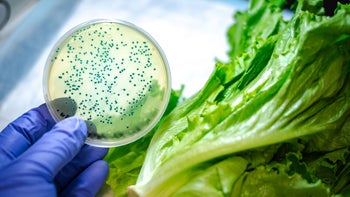
Trichinosis: How Undercooked Meat Can Cause More Than Food Poisoning
Key takeaways:
Trichinosis is an infection from a parasite. It is caused by eating undercooked meat — most commonly pork.
Symptoms can go beyond belly pain and diarrhea. They can also include muscle pain, facial swelling, fever, and chills. In rare cases, trichinosis can cause more serious problems with the brain, heart, and lungs.
If you develop food poisoning symptoms that don’t seem to go away, there are specific tests and treatment for trichinosis.

Most people know what food poisoning looks like. You get home from a big meal, and later that night you get an upset stomach and start vomiting. Many times food poisoning is caused by familiar bacteria like Salmonella or E. coli. But it can have other causes, too. One of these is trichinosis, which is an illness caused by a parasite that people get after eating undercooked meat. It usually causes a more severe infection than a typical round of food poisoning. And in rare cases, it can lead to serious complications. We’ll go through how you get trichinosis, what the symptoms look like, and how you can tell it apart from other forms of food poisoning.
What causes trichinosis?
Trichinosis — also called trichinellosis — is an infection caused by a parasite. The parasite belongs to the family known as Trichinella. There are many different subtypes or species of Trichinella, but the most common one that causes illness in humans is called Trichinella spiralis.
Trichinosis is relatively rare in the U.S. It is more common in rural areas where people are more likely to eat wild meat.
How is trichinosis transmitted?
Trichinosis is transmitted when a person eats raw or undercooked meat that is infected with the parasite. Most commonly, it is found in pigs, wild boar, and bear. But it can be found in other animals as well, including dogs, cats, rats, foxes, and wolves. Animals get it from eating other animals that are infected.
A person cannot get trichinosis from being around or touching an infected animal or human.
What are the symptoms of trichinosis?
The symptoms of trichinosis can vary from person to person. The severity of the symptoms usually depends on the amount of undercooked meat a person has eaten. If someone eats only a small amount of infected meat, they may develop a very mild infection. But if they eat a lot of it, they may develop a more severe infection.
The symptoms of trichinosis generally progress or become worse over time. In the first week of infection, a person may develop symptoms related to the parasite entering the stomach. These include:
Nausea
Diarrhea
Abdominal pain
In the following 2 to 6 weeks, new symptoms may develop. These are related to newborn parasites — or larvae — hatching in the stomach. The larvae then travel through the bloodstream, causing the immune system to react. This can cause a person to develop:
Fever
Chills
Muscle pain
Swelling of the face, especially around the eyes
Eye pain when looking in different directions
Red spots in the eyes
Rash or itchy, red raised areas on the skin
Dark purple or red spots underneath fingernails and/or toenails
Fatigue
Dry cough
If someone eats a large amount of infected meat, they may develop a severe infection. This can lead to worsening complications over time. The parasite can travel into different organs and can lead to:
Heart problems: Trichinosis can cause inflammation of the heart muscle, known as myocarditis. It can also lead to abnormal heartbeats, known as arrhythmia.
Lung problems: Trichinosis can cause inflammation of the lungs and the tissue surrounding the lungs. This is called pneumonitis, pleuritis, or pleurisy.
Neurological problems: Trichinosis can cause inflammation of the brain (encephalitis) and the membranes surrounding the brain (meningitis).
When should I see a doctor for suspected food poisoning?
Trichinosis is just one type of infection that results from eating infected or undercooked food. But a person can develop food poisoning from eating any food that is infected with a virus, bacteria, or parasite.
If you think you might have food poisoning of any kind, you should see a doctor if you develop:
Serious pain
Blood in your vomit or poop
Dark urine
A significant decrease in urine production
A feeling of fluttering or palpitations in your chest
Dizziness or lightheadedness
Extreme tiredness or confusion
A provider can run tests to help figure out what may be going on. If they suspect trichinosis specifically, they can order blood tests or even take a sample of your muscle tissue for diagnosis.
How is trichinosis treated?
If you are diagnosed with trichinosis, your doctor will get you started on treatments right away. Most commonly, these include:
Antiparasitic drugs, such as albendazole or mebendazole.
Anti-inflammatory drugs, such as NSAIDs (Non-steroidal anti-inflammatory drugs) or steroids.
In mild to moderate cases of trichinosis, the symptoms will generally go away on their own after about three months. If the infection is more severe, you may need a longer course of treatment to get rid of the infection.
The bottom line
Trichinosis is a rare form of food poisoning. But it is potentially serious. It is most often caused by eating undercooked pig, boar, or bear meat. People who are infected tend to develop worsening symptoms over time. In very rare cases, trichinosis may even lead to serious complications involving the brain, heart, or lungs. But there is treatment available. So it is best to see a provider for any concerning symptoms.
Why trust our experts?


References
Centers for Disease Control and Prevention. (2020). Parasites- Trichinellosis.
Centers for Disease Control and Prevention. (2020). About trichinellosis.
Furhad, S., et al. (2022). Trichinosis. StatPearls.
Gottstein, B., et al. (2009). Epidemiology, diagnosis, treatment, and control of trichinellosis. Clinical Microbiology Reviews.
Marie, C., et al. (2022). Trichinosis. Merck Manual Professional Version.
New York State. (2016). Trichinosis.
NYC Health. (n.d.). Trichinosis.
World Health Organization. (2021). Foodborne parasitic infections: Trichinellosis (trichinosis).














